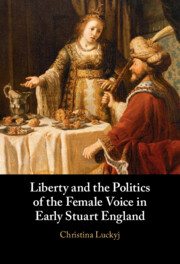
- Cited by 4
-
Cited byCrossref Citations
This Book has been cited by the following publications. This list is generated based on data provided by Crossref.
Luckyj, Christina 2023. The Palgrave Encyclopedia of Early Modern Women's Writing. p. 1.
Kolb, Laura 2024. The Palgrave Encyclopedia of Early Modern Women's Writing. p. 1.
Martin, Catherine Gimelli Timmis, Patrick Stelzer, Emily Dyck, Paul James, Anne and Urban, David V 2024. IXThe Seventeenth Century, Part I. The Year's Work in English Studies, Vol. 103, Issue. 1, p. 509.
Dodds, Lara and Dowd, Michelle M 2025. Early Modern Women’s Writing and the Future of Literary History.
- Publisher:
- Cambridge University Press
- Online publication date:
- February 2022
- Print publication year:
- 2022
- Online ISBN:
- 9781108954525


